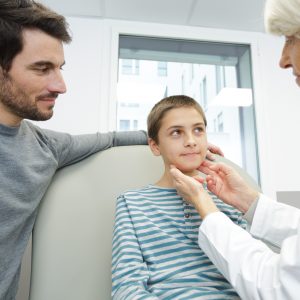From Resilience to Relief
Max stumbles into the kitchen, sees me sipping my coffee, and hugs my neck – he’s got a fever. “Hi, Aunt Meg,” he mumbles, his sweet 5-year-old voice slightly muffled. I ask my sister when my nephew was last on antibiotics – two weeks prior.
“I think he might have strep again…” My current status as a medical student, coupled with the knowledge that Max had been treated for recurrent streptococcal pharyngitis gave me the confidence to make this statement. “Dios mio,” my brother-in-law mutters under his breath. “Are you sure?” I tell him that I am not, but I recommend a trip to the pediatrician.
A couple of hours later, the diagnosis is confirmed. It is Max’s sixth time to have strep throat in as many months, and he has been prescribed yet another round of amoxicillin. His pediatrician has made a referral to an ear, nose, and throat (ENT) specialist to discuss a possible tonsillectomy.

“Absolutely not. They are not cutting into my son!” my brother-in-law declares, making his position clear. A college professor with a PhD in physical chemistry, W is one of the most intelligent people I know. He is thoughtful, analytical, and rational. He also has a deep distrust of the medical system.
W was born and raised in the Dominican Republic. His earliest memories of the medical system are entangled with the death of his father; later health care memories are tied to the death of his older brother. While in Puerto Rico for his doctoral studies, he said his final goodbyes to a close friend who died due to complications from an elective heart procedure. W’s distrust of the medical system is not without good reason, and he is understandably hesitant about the possibility of his young son undergoing surgery.
“Can you talk some sense into him?!” my sister huffs as she moves to put the pink liquid medicine into the refrigerator. I look from her to him to Max, who, feeling miserable, has curled himself up on the couch.
My gut reaction is to play the role of the concerned aunt – appeal to my brother-in-law’s emotional side and talk about how much better his son will feel once his infection-prone tonsils have been removed. But then I consider how deeply W loves Max. His resistance to surgery does not come from a disregard of his son’s comfort, rather, I can see on his face that he is terrified about what outcomes may arise from a tonsillectomy.
“What concerns do you have?” I ask, reminding him that, as a student, I likely will not be able to address them all. “That doctor talked too fast. It was like she didn’t want me to know what was going on, and she just wants to operate!”
We talk. He wants to know why a tonsillectomy is favorable to repeated courses of antibiotics. I speak about antibiotic resistance and alteration of gut microbiome. He asks about the risks associated with tonsillectomy. I tell him about the recovery period, pain control, and the risk of bleeding. He wonders why they took so long to suggest surgery if this is the best option. I review with him the American Academy of Pediatrics recommendation for recurrent strep throat and criteria for tonsillectomy. He asks if I think having Max’s tonsils out is a good idea. I tell him I do. He asks if I think Max will be safe. I tell him I do. I help him develop a list of questions to discuss with the ENT, and I tell him his concerns are valid. Then I take off my medical student hat, return my aunt hat to its rightful place, and I watch cartoons with my nephew.
Trust is integral to successful medicine, and as a student, my responsibility to build trust does not end when I leave the hospital. One’s lived experiences often take precedence over rationality and knowledge when trust is at stake – even though my brother-in-law is a highly educated, logical individual, he does not automatically trust the recommendations of a physician simply because they are rooted in science. As health care professionals we must listen and strive to understand in order to build communication that facilitates trust.
W was able to discuss his concerns over Max’s surgery with the ENT. The physician sat down, took her time, and addressed his questions thoroughly. Though still nervous, W agreed to proceed with the surgery, and Max is now successfully tonsil – and strep – free.
Meg Sorg will be starting her second year of medical school at the University of Kentucky College of Medicine this August. She is a nontraditional student with a background in pediatric nursing, and she loves spending time with her husband and four young children.

